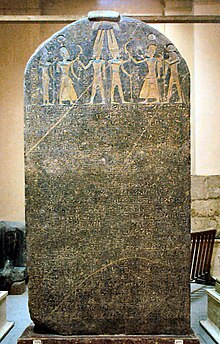 |
| The Merneptah Stele, one of the earliest mentions of Yenoam, courtesy, Wikipedia |
“The princes are
prostrate, saying “Peace!”; Not one raises his head among the Nine Bows. … Plundered
is Canaan with every evil;…;Yenoam is made as that which does not exist; Israel
is laid waste, his seed is not;…; All lands together are pacified.”
This
stele is also where the name “Israel” is mentioned for the first time outside
of Biblical sources.
Some
of the suggested sites of Yenoam put forth by archaeologists and historians include:
Tell Na'am near the
Jewish community of Yavne'el in southeastern Galilee. This site
would be visited from time to time by the residents of Yavne’el which was established
in 1901 on lands purchased by the Baron de
Rothschild in coordination with the Jewish
Colonization Association. Its first residents were evicted from
their previous homes in the Hauran (in southern Syria) in 1898 by the Ottoman
authorities;
Tell Shihab in the Yarmouk River valley in southern Syria.
During the Ottoman period, a group of Arab colonists settled there and formed a
settlement in which state in remains to this day;
Tell Na'ama in the Hula Valley in the upper Galilee;
and Tell Ovadya archaeological site in the Jordan Valley.
Yenoam
has also been tentatively associated with the biblical city of Janoah situated on the northern border of
Ephraim tribal territory.
No comments:
Post a Comment